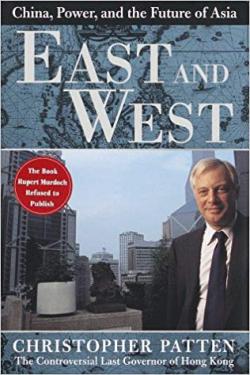East and West: China, Power, and the Future of Asia

By Christopher Patten
Times Books; 1 edition (1998)
ISBN: 0812930002
Review by Sean Curtin
Chris Patten, now the Right Honourable Lord Patten of Barnes and a recent Japan Society guest speaker, wrote this thought-provoking book shortly after standing down as the last ever British Governor of Hong Kong in 1997. Even though it is rapidly approaching a decade since Britain's most prosperous colony was returned to China, Patten's insights on his five years of dealings with the Middle Kingdom are not only still highly relevant but also enhance our understanding of the dynamics governing today's turbulent Tokyo-Beijing relationship.
Somewhat unexpectedly the book offers a glimmer of hope for China-Japan relations by providing a firm baseline with which to compare Japanese Prime Minister Junichiro Koizumi's strained relationship with Beijing. Tensions with the Chinese leadership largely stem from the Premier's controversial visits to the contentious Yasukuni Shrine, which honours 14 Class-A war criminals who China views as responsible for the deaths of millions of Chinese. However, Patten's own difficulties with Beijing puts this bilateral friction in much better perspective and actually demonstrates that Chinese diplomacy today is far more progressive and sophisticated than it was a decade ago. True, there are echoes of the past in Beijing's criticisms of Koizumi, but the language and arguments are infinitely more moderate and refined, reflecting the country's increasingly prominent position on the global stage.
Compared to the endless barrage of harsh insults hurled at the then Governor Patten, who amongst other things was labelled "mad" "evil" and "the poisoned tango dancer," the rhetoric about Koizumi's shrine pilgrimages seems balanced and restrained. New variants of some of the harder-edged Chinese diplomatic tactics Patten experienced during the nineties are still recognizable today, but in considerable toned-down formats, offering the prospect that Beijing and Tokyo will eventually be able to resolve their many differences.
Besides analyzing his choppy relationship with Beijing, Patten also explores wider issues such as the so called "Asian values" argument. He passionately believes that democracy, universal human values and individual rights are not alien concepts in the Far East as the Asian Values theorists insist. He views proponents of the Asian values thesis as being merely apologists for authoritarian and undemocratic regimes.
Interestingly, Patten shows that having a poor political dialogue with Beijing does not necessarily affect bilateral trade flows. He illustrates this point with US-China relations, which flourished during the nineties at the zenith of Washington's anti-China rhetoric. There are clear parallels today with booming China-Japan economic links which perfectly coincide with abysmal political ties. Chinese President Hu Jintao characterizes Sino-Japanese bonds as "hot economically, but cool politically."
In his 1st June speech to the Japan Society, Lord Patten touched on many of these themes as well as a few additional ones he develops in his new book, "Not Quite The Diplomat" (soon to be featured in Japan Book Review). He reminded society members that "China's rise creates a whole new world" and predicted that "the way Japan handles its relations with China will also have an important impact on how the US and the EU deal with China."
Lord Patten spoke warmly about his relations with Tokyo while Governor, echoing comments in his book in which he observes that Japanese firms were so efficient at winning contracts in Hong Kong that sometimes it felt like "a Japanese colony." He enjoyed excellent relations with Japanese diplomats in the territory and informed the audience that the current Japanese Ambassador to the UK, His Excellency Yoshiji Nogami, was an old colleague from his time as Governor, when the Ambassador was the Consul General of Japan to Hong Kong (1994-96).
Generating some laughter near the end of his speech, Lord Patten confessed that he had first visited Japan as a young British politician and his status as a junior lawmaker had obliged him to participate in the unforgettable Hanamaki noodle-eating contest in which, much to his regret, he flunked out after just six bowls. His Japan Society speech, very much reflects the contents of his book: a stimulating and witty piece of work with excellent insights and analysis.

